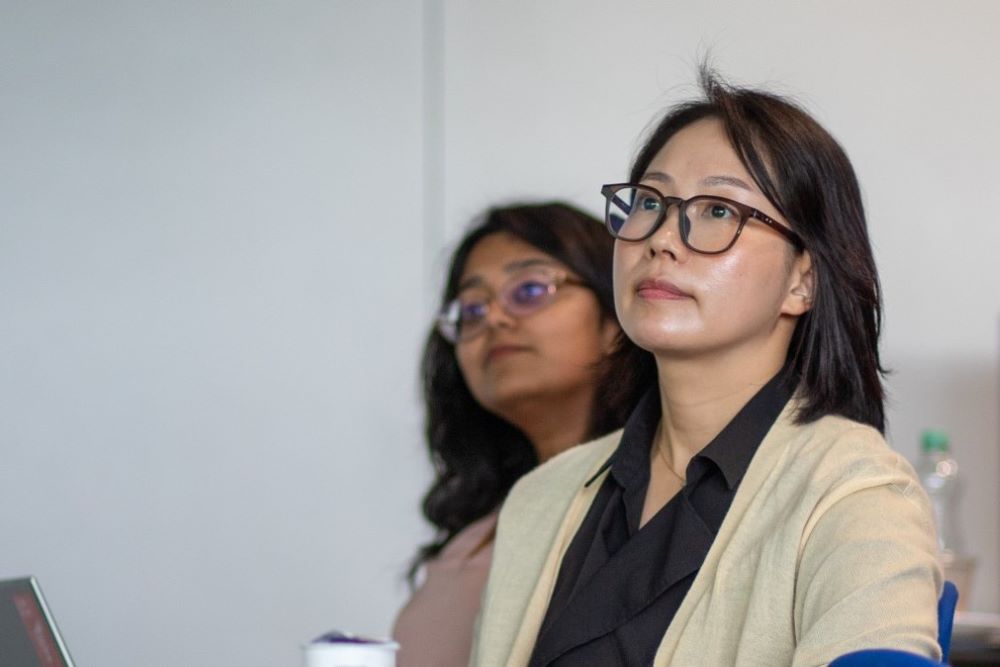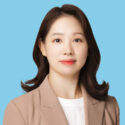Dongyoun Cho joined UNIDIR in March 2023 as a Senior Researcher in the Security & Technology Programme. With an academic and military background, Dongyoun leads the artificial intelligence team, researches the intersection of international security and emerging technologies such as artificial intelligence, autonomy, cyber, quantum, and space, and spearheads UNIDIR’s Global Disarmament Research Network Initiative on Artificial Intelligence Governance in the Military Domain (MIL-AI Network). As she prepares to move back to her native South Korea to continue her work for UNIDIR, we sat down with her to learn more about her hopes and aspirations.
What motivates you to move back to South Korea while continuing your work with UNIDIR? How do you think this change will impact your work on emerging technologies and international security?
The main motivation for moving back to Korea is to connect various elements that are vital for advancing our work in emerging technologies and international security. Asia’s influence on the global economy and international affairs is rapidly increasing. As Kishore Mahbubani, former President of the UN Security Council, termed it, “The Asian Century” is upon us. Recognizing and integrating Asia’s significance into global peace and security efforts is essential.
At UNIDIR’s Security and Technology Programme, our goal is to anticipate emerging threats rather than react to current ones. Establishing a regional hub in Asia will significantly enhance UNIDIR’s presence in the region with a view to informing discussions on disarmament and security.
Being based in South Korea, I can better leverage local resources and networks. My university, Seokyeong University, has generously agreed to support this initiative by providing facilities and resources. This collaboration will enable deeper engagement with regional developments and stakeholders. The idea is to create a hub that facilitates dialogue and cooperation across Asia, encompassing Northeast Asia, Southeast Asia, and beyond. By connecting these dots—local expertise, regional developments, and global security initiatives—we can make substantial progress in our field.
When we go to your specific domain of expertise, artificial intelligence and international security, how can Asia, and specifically South Korea, contribute to advancements and innovations in the field?
South Korea’s role as a leader in AI is exemplified by its proactive stance in organizing conferences and summits such as the AI Seoul Summit, which was co-hosted by the UK government and the IEC and ISO Joint Committee for AI in May, and the Responsible AI in the Military Domain (REAIM) co-hosted by the Government of the Netherlands in September 2024. These events are not just about showcasing technological advancements but also about setting standards and frameworks for responsible AI use, a key concern for its government. By engaging with international stakeholders, South Korea helps shape global norms and practices in AI governance.
Looking a bit ahead, the next UNIDIR Innovation Dialogue will focus on quantum technologies and their implications for international peace and security. Countries like the U.S., China, and Japan are at the forefront of quantum technology, and their advancements have significant implications for global security and technology landscapes. By including experts from these countries in our dialogues, we aim to foster a collaborative environment that can address the challenges and opportunities presented by these emerging technologies.
You are spearheading the Global Disarmament Research Network Initiative on AI governance in the military domain. What do we need to look out for in this network?
Through the Global Disarmament Research Network, UNIDIR wants to include experts from all regions in its research activities. One recent example is the Women in AI Fellowship, which was designed to equip women diplomats with the knowledge to meaningfully engage in multilateral discussions on artificial intelligence. By bringing together a diverse group of experts, we hope to create a rich tapestry of perspectives that can inform and enhance our understanding of AI governance in the military domain.
Moving forward, we plan to expand our network to include more voices from the Global South. This region is often underrepresented in global discussions, and their inclusion is vital for a comprehensive understanding of the challenges and opportunities in AI governance. We are actively seeking to engage with experts from these regions to ensure their perspectives are heard and integrated into our work.
And on a more personal level, what are your aspirations when moving back to South Korea?
I am committed to highlighting the achievements of researchers from underrepresented regions, especially the Global South. By presenting their work, we can inspire others to join us in UNIDIR’s mission, which is ultimately to contribute to a sustainable and peaceful world. Additionally, I aim to bridge international knowledge with local impact, encouraging researchers to bring their expertise and viewpoints back to their own countries. This exchange can foster innovation and progress, ultimately contributing to global peace and security.

